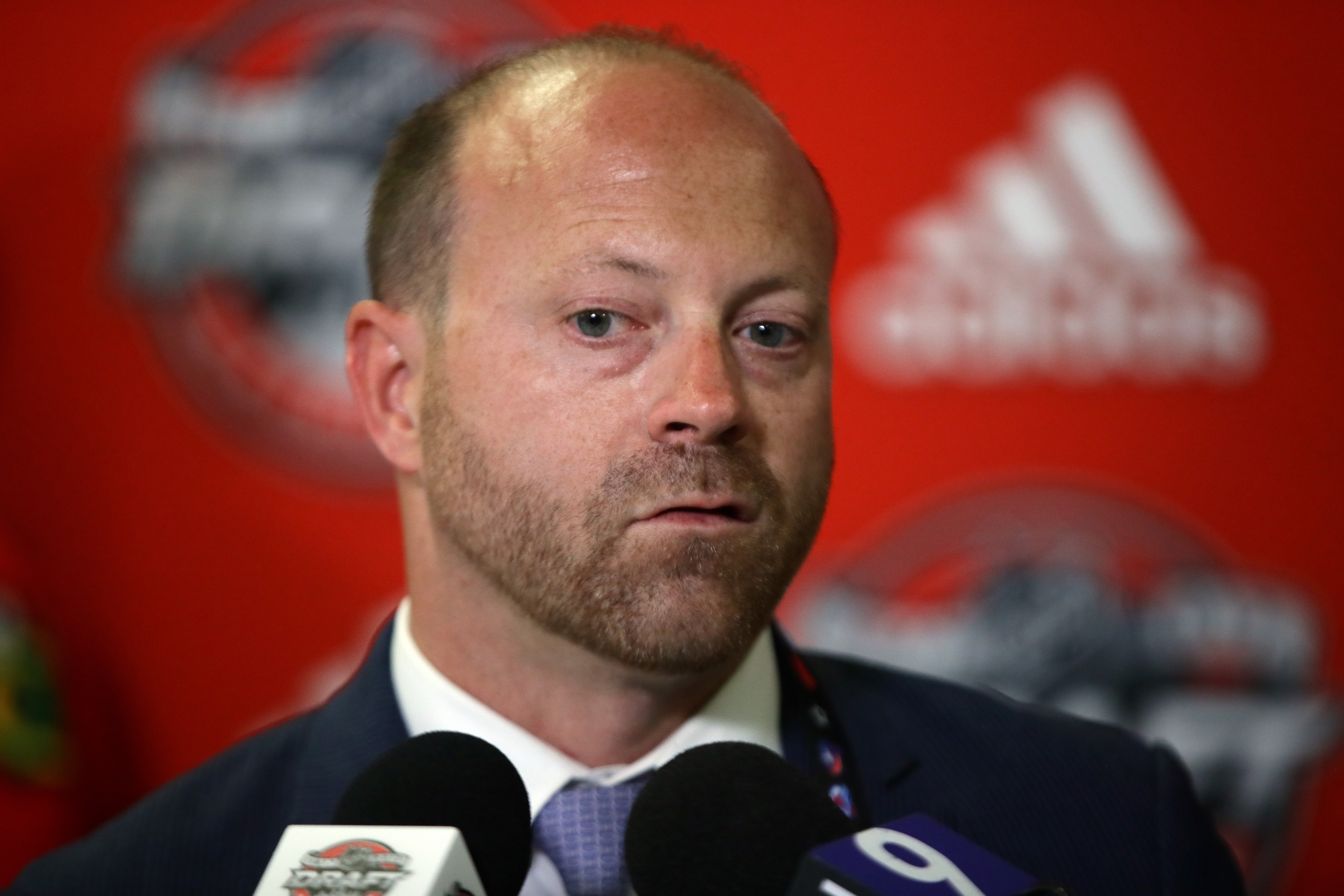The Edmonton Oilers named Stan Bowman their general manager and executive vice president of hockey operations Wednesday morning. Bowman spent more than a decade as GM of the Chicago Blackhawks before resigning in 2021. The Oilers, who were a game shy of a Stanley Cup this past June, seem to think Scotty Bowman's embarrassing son can get them over the hump.
The 70-page Jenner & Block investigation that prompted Bowman’s resignation introduces the executive by way of his responsibilities: “Bowman oversees all day-to-day hockey operations, including drafting and trading players, negotiating contracts, identifying prospect players, and overseeing the hiring of coaches and hockey operations employees.” At every aspect of this job, Bowman failed.
The Jenner & Block report described inaction throughout the organization in 2010, when Kyle Beach, a Black Ace called up to the team during the Blackhawks' Stanley Cup run, told staff he'd been sexually assaulted by video coach Brad Aldrich. A group of executives, including Bowman, met to discuss the allegations shortly after the Blackhawks won the Western Conference Final. When interviewed by investigators, none of them agreed on how the meeting ended. But what isn't in dispute is that Aldrich faced no immediate consequences. For weeks, he continued to work and travel with the team. At the Blackhawks' Stanley Cup celebration, Aldrich sexually harassed a 22-year-old intern. Given the option to undergo a human resources investigation or resign, Aldrich resigned.
No investigation was conducted. Aldrich received a severance and a playoff bonus, and continued to be paid a salary for several months. He was permitted to host the Stanley Cup for a day in his hometown, his name was engraved on the Stanley Cup, he received a championship ring, and he attended a Stanley Cup banner-raising ceremony at the United Center. He went on to have paid and unpaid positions with USA Hockey, the University of Notre Dame, Miami University in Ohio, and Houghton High School in Houghton, Michigan. While in Houghton, in 2013, Aldrich was arrested and pled guilty to fourth degree criminal sexual conduct involving a minor.
Shortly after the investigation's findings were released, NHL commissioner Gary Bettman ruled Bowman, head coach Joel Quenneville, and executive Al MacIsaac—all present in the 2010 meeting—ineligible to work in the league. Earlier this month, the NHL reinstated all three, citing their remorse, demonstrated personal growth and participation in “myriad programs.”
While the league's statement was vague, a letter from Sheldon Kennedy offers more detail. Kennedy, a former NHL player and sexual abuse survivor, has become a leading spokesperson against sexual abuse in hockey. Last week he wrote a statement titled “My Work with Stan Bowman,” in which he vouched for Bowman. “During our many conversations he took accountability for his actions and genuinely wanted to learn how to do better. His desire to acknowledge his mistakes and make amends with Kyle was sincere.”
Kennedy also described Bowman’s volunteer work with Respect Group, Kennedy's advocacy organization. At the press conference to announce Bowman's hire today, Oilers CEO Jeff Jackson said he'd reached out to Beach and received “positive approval” to have Bowman reinstated. Bowman added that he keeps in touch with Beach and spoke with him Tuesday night. “It was a very encouraging conversation,” Bowman said. He did not say whether he had spoken with “John Doe 2,” the high school player sexually assaulted by Aldrich in Houghton three years after Aldrich left the Blackhawks. TSN's Rick Westhead reported that “John Doe 2” signed a non-disclosure agreement when his lawsuit against the Blackhawks was settled out of court.
The Blackhawks scandal has been taken as a story of winning at every cost, and it is certainly that. Executives in the May 2010 meeting were, per the Jenner & Block report, reluctant to “disturb team chemistry” during the playoffs. But what of Bowman's other duties, even excluding hiring and overseeing employees? None of the first-round draft picks Bowman made in his first 10 years with the Blackhawks remain on the roster. He received little value for the good players he traded away. If he steered the team through three championships, they were won by a core in place before he took the job, a core he probably failed to maximize. In the season when Bowman resigned, the Blackhawks finished 28-42-12.
To count the Oilers' hiring of Bowman as another example of hockey's ruthless, win-at-all costs mindset, frankly, gives the sport too much credit. Countless recent stories have exposed the sport's incurious and insular culture. In the NHL especially, a league that frequently cycles through coaches and executives, that culture is made by the same people over and over again. Every day, hockey's decision-makers choose to keep it this way.






